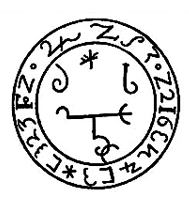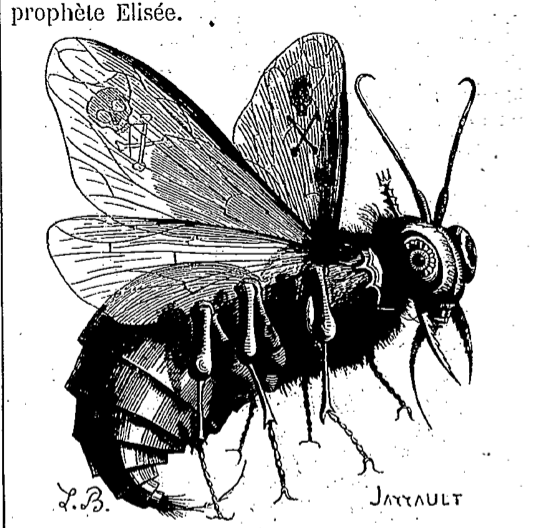Difference between revisions of "Beelzebub"
Occultwiki (talk | contribs) |
Occultwiki (talk | contribs) |
||
| Line 37: | Line 37: | ||
==Christian tradition== | ==Christian tradition== | ||
[[File:Beelzebub Sigil.jpg|350px|thumb|Summoning sigil of Beelzebub]] | [[File:Beelzebub Sigil.jpg|350px|thumb|Summoning [[sigil]] of Beelzebub]] | ||
Beelzebub is commonly described as placed high in [[hierarchy of Hell|Hell's hierarchy]]. According to the stories of the 16th-century [[occultist]] [[Johann Weyer]], Beelzebub led a successful revolt against [[the Devil]], is the chief lieutenant of [[Lucifer]], the Emperor of Hell, and presides over the Order of the Fly. Similarly, the 17th-century [[exorcist]] Sébastien Michaëlis, in his Admirable History (1612), placed Beelzebub among the three most prominent [[fallen angel]]s, the other two being Lucifer and [[Leviathan]]. John Milton, in his epic poem ''Paradise Lost'', first published in 1667, identified an unholy trinity consisting of Beelzebub, Lucifer, and [[Astaroth]], with Beelzebub as the second-ranking of the many fallen angels. Milton wrote of Beelzebub "than whom, [[Satan]] except, none higher sat." Beelzebub is also a character in John Bunyan's ''The Pilgrim's Progress'', first published in 1678. | Beelzebub is commonly described as placed high in [[hierarchy of Hell|Hell's hierarchy]]. According to the stories of the 16th-century [[occultist]] [[Johann Weyer]], Beelzebub led a successful revolt against [[the Devil]], is the chief lieutenant of [[Lucifer]], the Emperor of Hell, and presides over the Order of the Fly. Similarly, the 17th-century [[exorcist]] Sébastien Michaëlis, in his Admirable History (1612), placed Beelzebub among the three most prominent [[fallen angel]]s, the other two being Lucifer and [[Leviathan]]. John Milton, in his epic poem ''Paradise Lost'', first published in 1667, identified an unholy trinity consisting of Beelzebub, Lucifer, and [[Astaroth]], with Beelzebub as the second-ranking of the many fallen angels. Milton wrote of Beelzebub "than whom, [[Satan]] except, none higher sat." Beelzebub is also a character in John Bunyan's ''The Pilgrim's Progress'', first published in 1678. | ||
Revision as of 23:52, 14 September 2023
Beelzebub (/biːˈɛlzɪbʌb/ bee-EL-zi-bub or /ˈbiːlzɪbʌb/ BEEL-zi-bub; Hebrew: בַּעַל זְבוּב Baʿal Zəḇūḇ) or Beelzebul is a name derived from a Philistine god, formerly worshipped in Ekron, and later adopted by some Abrahamic religions as a major demon. The name Beelzebub is associated with the Canaanite god Baal.
In Christian theology texts, Beelzebub is another name for Satan. He is known in demonology as one of the seven princes of Hell. The Dictionnaire Infernal describes Beelzebub as a being capable of flying, known as the "Lord of the Flyers," or the "Lord of the Flies."
He rules over the 1st degree of diabolical spirits, the False Gods.
Old Testament
The source for the name Beelzebub is found in the Books of Kings (2 Kings 1:2–3, 6, 16), written Ba'al Zəbûb, referring to a deity worshipped by the Philistines. The title Baal, meaning "Lord" in Ugaritic, was used in conjunction with a descriptive name of a specific god. Opinions differ on what the name means.
In one understanding, Ba'al Zəbûb is translated literally as "lord of the flies"." It was long ago suggested that there was a relationship between the Philistine god, and cults of flies—referring to a view of them as pests, feasting on excrement—appearing in the Hellenic world, such as Zeus Apomyios or Myiagros. This is confirmed by the Ugaritic text which depicts Ba'al expelling flies, which are the cause of a person's sickness.
According to Francesco Saracino (1982) this series of elements may be inconclusive as evidence, but the fact that in relationship to Ba'al Zebub, the two constituent terms are here linked, joined by a function (ndy) that is typical of some divinities attested in the Mediterranean world, is a strong argument in favor of the authenticity of the name of the god of Ekron, and of his possible therapeutic activities, which are implicit in 2 Kings 1:2–3, etc.
Alternatively, the deity's actual name could have been Ba'al Zəbûl, "lord of the (heavenly) dwelling", and Ba'al Zebub could have been a derogatory pun used by the Israelites.
The Septuagint renders the name as Baalzebub (Βααλζεβούβ) and as Baal muian (Βααλ μυῗαν, "Baal of flies"). However, Symmachus may have reflected a tradition of its offensive ancient name, when he rendered it as Beelzeboul.
Testament of Solomon

In the Testament of Solomon, Beelzebul (not Beelzebub) appears as prince of the demons and says he was formerly a leading heavenly angel who was associated with the star Hesperus (which is the normal Greek name for the planet Venus (Aphrodite, Αφροδíτη) as evening star). Seemingly, Beelzebul here is synonymous with Lucifer. Beelzebul claims to cause destruction through tyrants, to cause demons to be worshipped among men, to excite priests to lust, to cause jealousies in cities and murders, and to bring on war. The Testament of Solomon is an Old Testament pseudepigraphical work, purportedly written by King Solomon, in which the author mostly describes particular demons whom he enslaved to help build Solomon's Temple, with substantial Christian interpolations.
New Testament
In Mark 3:22, the scribes accuse Jesus of driving out demons by the power of Beelzebul, the prince of demons, the name also appears in the expanded version in Matthew 12:24,27 and Luke 11:15, 18–19. The name also occurs in Matthew 10:25.
Jesus knew their thoughts and said to them, "Every kingdom divided against itself will be ruined, and every city or household divided against itself will not stand. If Satan drives out Satan, he is divided against himself. How then can his kingdom stand? And if I drive out demons by Beelzebul, by whom do your people drive them out? So then, they will be your judges. But if I drive out demons by the Spirit of God, then the kingdom of God has come upon you."
—Matthew 12:25-28
It is unknown whether Symmachus the Ebionite was correct in identifying these names because we otherwise know nothing about either of them. Zeboul might derive from a slurred pronunciation of zebûb; from zebel, a word used to mean "dung" in the Targums; or from Hebrew zebûl found in 1 Kings 8:13 in the phrase bêt-zebûl, "lofty house".
In any case, the form Beelzebub was substituted for Beelzeboul in the Syriac translation and Latin Vulgate translation of the gospels, and this substitution was repeated in the King James Version, the resulting form Beelzeboul being mostly unknown to Western European and descendant cultures until some more recent translations restored it.
Beelzebub is also identified in the New Testament as the Devil, "the prince of demons." Biblical scholar Thomas Kelly Cheyne suggested that it might be a derogatory corruption of Ba'al Zəbûl, "Lord of the High Place" (i.e., Heaven) or "High Lord."
In Arabic translations, the name is rendered as Baʿl-zabūl (بعلزبول).
Christian tradition

Beelzebub is commonly described as placed high in Hell's hierarchy. According to the stories of the 16th-century occultist Johann Weyer, Beelzebub led a successful revolt against the Devil, is the chief lieutenant of Lucifer, the Emperor of Hell, and presides over the Order of the Fly. Similarly, the 17th-century exorcist Sébastien Michaëlis, in his Admirable History (1612), placed Beelzebub among the three most prominent fallen angels, the other two being Lucifer and Leviathan. John Milton, in his epic poem Paradise Lost, first published in 1667, identified an unholy trinity consisting of Beelzebub, Lucifer, and Astaroth, with Beelzebub as the second-ranking of the many fallen angels. Milton wrote of Beelzebub "than whom, Satan except, none higher sat." Beelzebub is also a character in John Bunyan's The Pilgrim's Progress, first published in 1678.
Sebastien Michaelis associated Beelzebub with the deadly sin of pride. However, according to Peter Binsfeld, Beelzebub was the demon of gluttony, one of the other seven deadly sins, whereas Francis Barrett asserted that Beelzebub was the prince of idolatry.
Within religious circles, the accusation of demon possession has been used as both an insult and an attempt to categorize unexplained behavior, such as schizophrenia. Not only had the Pharisees disparagingly accused Jesus of using Beelzebub's demonic powers to heal people (Luke 11:14–26), but others have been labeled possessed for acts of an extreme nature.
Down through history, Beelzebub has been held responsible for many cases of demonic possession, such as that of Sister Madeleine de Demandolx de la Palud, Aix-en-Provence in 1611, whose relationship with Father Jean-Baptiste Gaufridi led not only to countless traumatic events at the hands of her inquisitors but also to the torture and execution of that "bewitcher of young nuns", Gaufridi himself. Beelzebub was also imagined to be sowing his influence in Salem, Massachusetts; his name came up repeatedly during the Salem Witch Trials, the last large-scale public expression of witch hysteria in either North America or Europe, and afterwards, the Rev. Cotton Mather wrote a pamphlet titled Of Beelzebub and his Plot.
Other sources
Beelzebub was one of the demons that signed a diabolical pact with Urbain Grandier.
In the Occult Tarot, Beelzebub is The Moon card.
